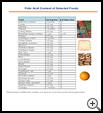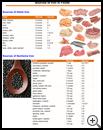
Diet for Anemia
________________________________________________________________________
KEY POINTS
- Anemia is a blood problem that keeps your cells from getting enough oxygen.
- Two common kinds of anemia may be caused by not having enough iron, or enough folic acid, in your diet.
- If you eat foods with the nutrients you need, you don’t need to take a supplement.
________________________________________________________________________
What is anemia?
Anemia is a blood problem. It can be either not having enough red blood cells (RBCs), or not having enough hemoglobin (the part of red blood cells that carries oxygen). If you don’t have enough red blood cells, have too little hemoglobin, or your hemoglobin is not working properly, you can’t get enough oxygen to your cells. Your cells need oxygen to work properly.
Iron deficiency anemia is the most common form of anemia. It happens when there is not enough iron in your blood to make all of the hemoglobin you need. Iron deficiency anemia may happen when there is not enough iron in your diet. It may also happen if you lose a lot of blood. For example, women lose iron in the blood during their menstrual periods. Another cause of blood and iron loss may be internal bleeding in the stomach or in the intestine. Pregnant women may have anemia because the baby uses iron from the mother’s body to make red blood cells and to grow.
Folic acid, also called folate, is a B vitamin that your body needs to make healthy red blood cells. Folic acid deficiency anemia can happen when you don’t get enough folic acid in your diet.
Vitamin B12 deficiency anemia, or pernicious anemia, most often happens when your intestines have trouble absorbing vitamin B12. Stomach or intestinal illness, some medicines, and some problems you are born with can keep your body from absorbing vitamin B12. Vitamin B12 deficiency anemia is most often treated with pills or shots of vitamin B12. Because this type of anemia is most often caused by the body not absorbing vitamin B12, it is not usually treated with diet, though improving your diet may help. Vitamin B12 is found in meat, fish, eggs, dairy products, and foods fortified with vitamin B12.
What diet helps iron deficiency anemia?
Iron is found in many kinds of foods. The best way to get enough iron is to eat a healthy, well-balanced diet. There are 2 types of iron:
- Heme iron is found in meat, poultry, and fish. Heme foods that are very high in iron, such as beef and chicken liver, are also very high in cholesterol. Eat these foods in limited amounts.
- Nonheme iron is found in fruits, vegetables, beans, brown rice, nuts, tofu, eggs, and iron-enriched bread, cereal, and pasta.
It’s harder for the body to absorb iron from plants than from meat, poultry, and fish. Eat foods that contain vitamin C, such as citrus fruits, broccoli, and tomatoes, when you eat plant foods that have iron. Eating these foods together helps your body to absorb the iron better. Eating heme iron at the same time as nonheme iron also helps your body absorb the iron better. This is very important if:
- You have a condition that makes you lose iron (for example, women who have heavy menstrual periods).
- You need more iron (for example, during pregnancy).
- You have a condition that keeps your body from absorbing iron well, such as Crohn’s or celiac disease.
Some foods, supplements, and medicines can make it harder for your body to absorb iron. It is best to eat iron at a different time than when you have:
- Milk and other dairy products
- Foods with a lot of fiber
- Coffee, tea, and carbonated drinks (even decaffeinated)
- Calcium supplements
- Antacids
You don't need a supplement if you get enough iron in your diet. Taking supplements you don’t need may be harmful. Too much iron in the body can damage your heart and liver.
If you have anemia, your healthcare provider may tell you to take an iron supplement. Iron pills can have side effects such as cramps, nausea, and constipation. Taking the iron at mealtimes can help prevent stomach upset. Extra iron may increase nausea during the first 3 months of pregnancy. If you take iron supplements in the morning and feel nauseated, try taking the pills at night before bedtime. To help prevent constipation, make sure you drink enough fluid and have enough fiber in your diet.
Ask your healthcare provider before you take a supplement that contains iron. With your provider’s approval, take the right amount for your age.
What diet helps folic acid deficiency anemia?
Folate is found naturally in vegetables, fruits and fruit juices, nuts, beans, peas, dairy products, poultry and meat, eggs, seafood, and grains.
It’s better to get folate from food sources instead of supplements. Folic acid supplements may interact with medicines that you take. Check with your healthcare provider before taking a supplement. You may have both vitamin B12 deficiency anemia and folic acid deficiency anemia. Large amounts of folic acid can hide problems caused by vitamin B12 deficiency.
How you cook food makes a big difference, because heat can destroy 50% to 90% of the folate in foods. It is best to eat raw and lightly cooked vegetables. Try steaming, stir-frying, or microwaving.
Good food sources include:
- Dark green, leafy vegetables, especially spinach, asparagus, and Brussels sprouts
- Whole wheat bread, fortified breakfast cereals, and grain products enriched with folic acid
- Lightly cooked beans and peas
- Nuts and seeds
- Sprouts
- Oranges and grapefruit, including juices. (One cup (8 oz) of orange juice provides half the recommended daily intake for folate.)
- Liver and other organ meats
- Chicken
- Yeast
Alcohol prevents your body from absorbing enough folic acid. If you are abusing or dependent on alcohol and want to quit, get help.
Ask your healthcare provider for a referral to a dietitian to learn more about eating healthy.


